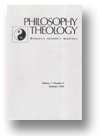|
articles |
|
1.
|
Philosophy and Theology:
Volume >
8 >
Issue: 1
Jon Nilson
The Unity of the Churches:
Actual Possibility or Eschatological Actuality?
abstract |
view |
rights & permissions
| cited by
This paper contends that the dispute between Avery Dulles and Karl Rahner on the prospects for the unity of the churches is not fundamentally theological. Instead, their sharply contrasting perceptions of contemporary culture lead them to construe the ecumenical imperative quite differendy. If this analysis is correct, what may be most divisive between and within the churches is not faith or doctrine at all but different readings of “the signs of the times.” If so, ecumenists will have to undertake cultural interpretation as an essential component of their work. Without careful cultural analyses, the goal of unity of the Christian churches may be held hostage to impressions stemming more from bias than reasoned judgments.
|
|
|
|
|
2.
|
Philosophy and Theology:
Volume >
8 >
Issue: 1
Stephen Fields
Blondel’s L’Action (1893) and Neo-Thomism’s Metaphysics of Symbol
abstract |
view |
rights & permissions
| cited by
The first three sections of this study explain the debt that Karl Rahner’s metaphysics of symbol owes to the influence of Maurice Blondel and Joseph Maréchal. The concluding section suggests that a Blondel-inspired renewal of the metaphysics of symbol could challenge the restricted claim for reason offered by secular and religious post-modernity.
|
|
|
|
|
3.
|
Philosophy and Theology:
Volume >
8 >
Issue: 1
Howard Ebert
Immutability of God:
Metaphysical Inconsistency or Essential Grounding for Human Transcendence
abstract |
view |
rights & permissions
| cited by
Mark Lloyd Taylor in God is Love: A Study in the Theology of Karl Rahner charges that Rahner’s understanding of the essential immutability of God renders his theology incoherent. For Taylor, Rahner’s assertion of God’s essential immutability prevents him from cartying through in a consistent manner the methodological turn to the subject which is at the heart of his theological project. An assessment of the validity of Taylor’s process-informed critique requires a careful examination of Rahner’s understanding of analogy. Analogy, for Rahner is not based on a conceptual or semantic distinction but on the ontological constitution of human transcendence. From Rahner’s perspective, Taylor’s critique is faulty because it springs from an impoverished view of Being and a diminished sense of the radical nature of human transcendence. While Taylor’s critique does not undermine Rahner’s position, it alerts one to the propensity of his position to generate substantialized interpretations and, at times, Rahner’s own tendency to dissolve too quickly dialectical tensions within his position.
|
|
|
|
|
4.
|
Philosophy and Theology:
Volume >
8 >
Issue: 1
Robert E. Doud
Matter and God in Rahner and Whitehead
abstract |
view |
rights & permissions
| cited by
The sciences and popular views generally consider matter from the bottom up, that is, as the least common denominator underlying all of its various forms and realizations. In Rahner sensibility is matter looked at from the top down, that is, with a view to the highest realization of matter in human beings, and in Christ. In Whitehead creativity is matter, not inert or static but spontaneous and active, and creativity is matter viewed in light of its highest realizations in humans and in God. So, in Rahner and in Whitehead, matter is viewed in much the same way, called sensibility in Rahner, and creativity in Whitehead, and defined in terms of its actualization in human nature.
|
|
|
|
|
5.
|
Philosophy and Theology:
Volume >
8 >
Issue: 1
Thomas G. Guarino
Rahner, Popper and Kuhn:
A Note on Some Critical Parallels in Science and Theology
abstract |
view |
rights & permissions
| cited by
The article discusses some parallels between Weltanschauung analysis in contemporary philosophy of science and Rahner’s criticism of the context/content approach to theological pluralism.
|
|
|
|
|
6.
|
Philosophy and Theology:
Volume >
8 >
Issue: 1
Melvin Michalski
Karl Rahner Society Bulletin, No. 3, March 1994
view |
rights & permissions
| cited by
|
|
|
|
|
index |
|
7.
|
Philosophy and Theology:
Volume >
8 >
Issue: 1
Index
view |
rights & permissions
| cited by
|
|
|
|
